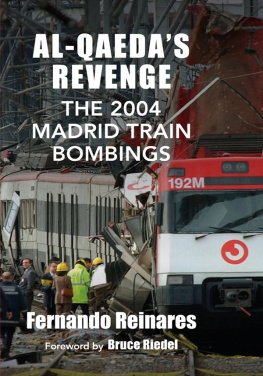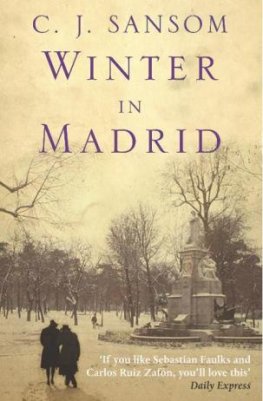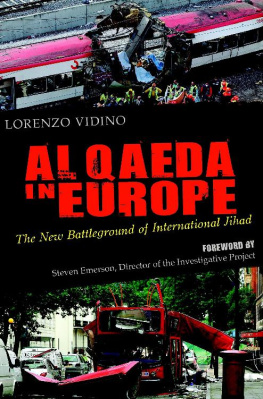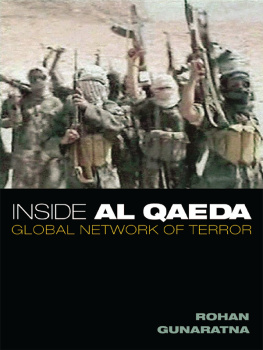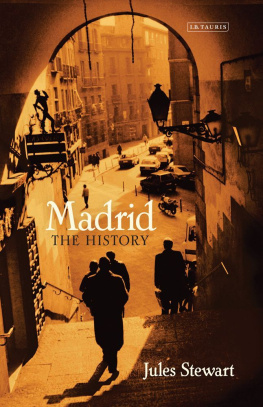Al-Qaedas Revenge
Al-Qaedas Revenge
The 2004 Madrid Train Bombings
Fernando Reinares
Woodrow Wilson Center Press
Washington, D.C.
Columbia University Press
New York
Woodrow Wilson Center Press
Washington, D.C.
www.wilsoncenter.org
Columbia University Press
Publishers Since 1893
New York Chichester, West Sussex
cup.columbia.edu
Copyright 2016 Fernando Reinares
All rights reserved
E-ISBN 978-0-231-80140-9
Library of Congress Cataloging-in-Publication Data
Names: Reinares, Fernando, 1960author.
Title: Al-Qaedas revenge: the 2004 Madrid train bombings / Fernando Reinares.
Other titles: Matadlos! English
Description: Washington, D.C. : Woodrow Wilson Center Press; New York: Columbia University Press, [2016] | Includes bibliographical references and index.
Identifiers: LCCN 2016043284 (print) | LCCN 2016057069 (ebook) | ISBN 9780231704540 (cloth: alk. paper) | ISBN 9780231801409 (ebook)
Subjects: LCSH: Madrid Train Bombings, Madrid, Spain, 2004. | TerrorismSpainMadridHistory21st century. | TerrorismReligious aspectsIslam. | Qaida (Organization)
Classification: LCC HV6433.S7 R4513 2016 (print) | LCC HV6433.S7 (ebook) | DDC 363.325/93884094641dc23
LC record available at https://lccn.loc.gov/2016043284
A Columbia University Press E-book.
CUP would be pleased to hear about your reading experience with this e-book at .
Cover photo: Rescue workers work around the destroyed intercity train at the Atocha train station in Madrid on March 11, 2004. AP Photo/Peter Dejong
Design and layout: Station 10 Creative
The Wilson Center, chartered by Congress as the official memorial to President Woodrow Wilson, is the nations key nonpartisan policy forum for tackling global issues through independent research and open dialogue to inform actionable ideas for Congress, the Administration, and the broader policy community.
Conclusions or opinions expressed in Center publications and programs are those of the authors and speakers and do not necessarily reflect the views of the Center staff, fellows, trustees, advisory groups, or any individuals or organizations that provide financial support to the Center.
Please visit us online at www.wilsoncenter.org.
Jane Harman, Director, President, and CEO
Board of Trustees
Thomas R. Nides, Chair
Public members: William D. Adams, Chairman of the National Endowment for the Humanities; Sylvia Mathews Burwell, Secretary of Health and Human Services; David Ferriero, Archivist of the United States; Carla D. Hayden, Librarian of Congress; John F. Kerry, Secretary of State; John B. King Jr., Secretary of Education; David J. Skorton, Secretary of the Smithsonian Institution. Designated appointee of the president from within the federal government: Vacant
Private citizen members: Peter J. Beshar, Thelma Duggin, Barry S. Jackson, David Jacobson, Nathalie Rayes, Earl W. Stafford, Jane Watson Stetson, Louis Susman
Wilson National Cabinet
Ambassador Joseph Gildenhorn & Alma Gildenhorn, Co-chairs
Peter J. Beshar, Eddie & Sylvia Brown, Ambassador Sue & Ambassador Chuck Cobb, Lester Crown, Thelma Duggin, Judi Flom, Sander R. Gerber, Harman Family Foundation, Frank F. Islam, Willem Kooyker, Frederic V. & Marlene A. Malek, Ambassador Robert A. & Julie Mandell, Thomas R. Nides, Adam H. Offenhartz, Nathalie Rayes, Wayne Rogers, B. Francis Saul II, Diana Davis Spencer, Earl W. Stafford, Bobby and Mary Stein, Jane Watson Stetson, Leo Zickler
Maps
1. The Madrid Metropolitan Area
2. Key Cities and Locations in Spain
3. Western Europe and the Mediterranean
4. The Madrid Train Bombings
Figures
1. Diagram of the Madrid Train Bombings
2. The Composition of the 3/11 Network
This book was made possible thanks to the affection and support of many people, ranging from uniquely loving intimates and relatives, to whom I offer my deepest gratitude, to friends and colleagues, who in many cases, most fortunately, belong to both categories. All of them know personally the depth of my gratitude. Thanks are also due for the collaboration of many judicial, police, and intelligence senior officials, both inside and outside Spain, who, if not explicitly mentioned, it is because they prefer to remain anonymous. The research for this book was done between 2008 and 2013, and was conducted in a good number of countries across the world, mainly while I was based at the Elcano Royal Institute (Real Instituto Elcano) in Madrid. But I also strongly benefited from the help provided by the Universidad Rey Juan Carlos, also in Madrid, and by the Woodrow Wilson International Center for Scholars, as well as by the Center for Security Studies at Georgetown University, in Washington. When it comes to people I can name, I am especially grateful to Carola Garca-Calvo, Emilio Lamo de Espinosa, Bruce Hoffman, Rob Litwak, Charles Powell, and Bruce Riedel. And I am also grateful to Isabel Bazaga, Rut Bermejo, Mara Cifuentes, Lee Hamilton, Javier Jordn, Maite Pagazaurtundua, Joan Tarrida, Pedro Gonzlez-Trevijano, and, last but not least, Peter Waldmann. I was privileged to participate in exchanges on 3/11 with, among others, Bruno Megale, Rafael Gmez Menor, Jess de la Morena, Mara Ponte, and Javier Zaragoza. A true gift for me was the assistance provided by Antoine Garapon, Juan Antonio Jabaloy, Carolina Jimnez, ngel Llorente, Marco Lombardi, Francisco de Miguel, lvaro Vicente, Cristina Villa, and Christopher Wall. Gracias, muchas gracias, to Joe Brinley and Shannon Granville of the Woodrow Wilson Center Press, to Alfred F. Imhoff, and to Anne Routon of Columbia University Press. The memory of the victims of the March 11 attacks was and is always present in my mind and in my heart.
Bruce Riedel
On March 11, 2004, at about seven-thirty in the morning, ten explosive devices were detonated on four commuter trains in Madrid, killing 191 and wounding more than 1800 people. It was the deadliest terrorist attack in Europe since the downing of the Pan Am Flight 103 jumbo jet in December 1988 over Lockerbie, Scotland. Since the Madrid attacks, terrorist attacks have struck across Europe from London to Paris, Brussels, Nice, and elsewhere. Madrid began the carnage that al-Qaeda and its offspring, including the Islamic State, have waged relentlessly since that morning rush hour in Madrid.
Assigning responsibility for the attack in Madrid has been a source of intense controversy. The bombings took place only three days before national elections in Spain. The ruling government, led by Prime Minister Jos Mara Aznar, initially sought to blame the attack on the Basque separatist group ETA (Euskadi ta Askatasuna). It rushed to the United Nations Security Council and had a resolution, number 1530, adopted unanimously that same day, blaming ETA for the attack. It quickly became apparent, however, that the attack was the work of Islamic extremists with ties to al-Qaeda. Aznars party lost the election, and the new Spanish government withdrew its troops from the American-led occupation of Iraq, in a move widely seen as an early vote of no confidence in the Iraq war.
Now we have this fabulous piece of history by Fernando Reinares, which provides the first in-depth account of the plot behind the 3/11 attacks. Contrary to the accounts circulating at the time, which emphasized that the plot was the work of a loosely organized, self-recruited group of local jihadists without any real organizational connection to al-Qaeda, this definitive account shows that the plotters were from a long-established al-Qaeda cell with strong connections to the senior al-Qaeda leadership then hiding in Pakistan, including Osama bin Laden.

